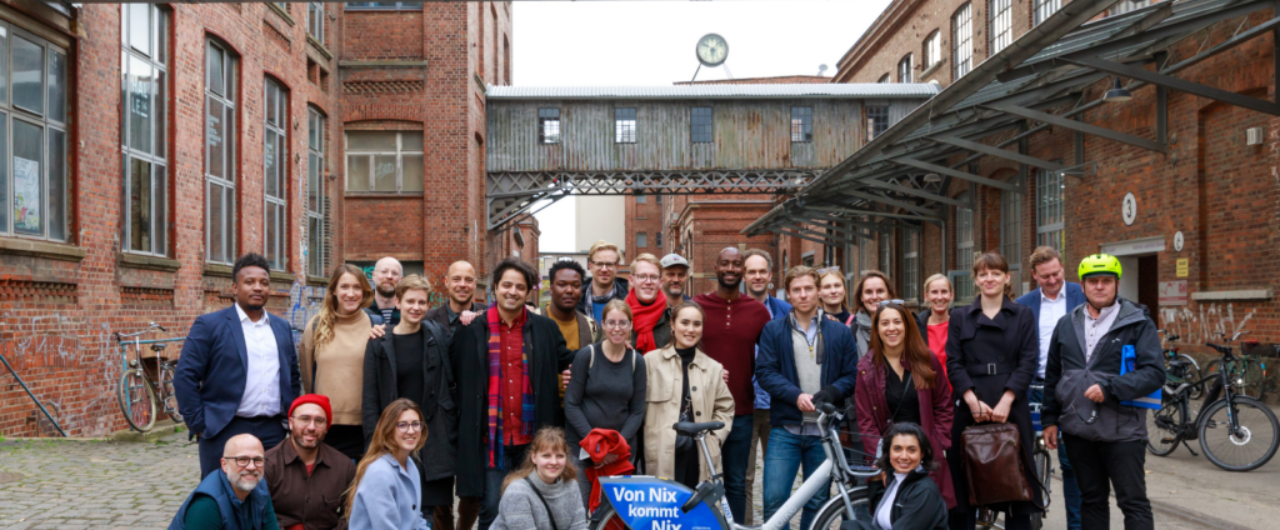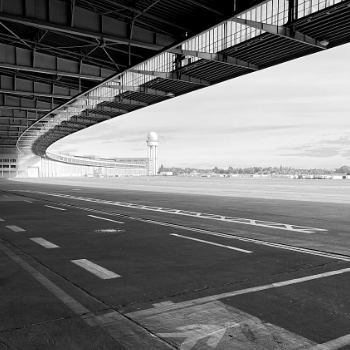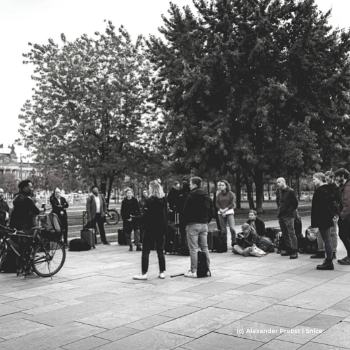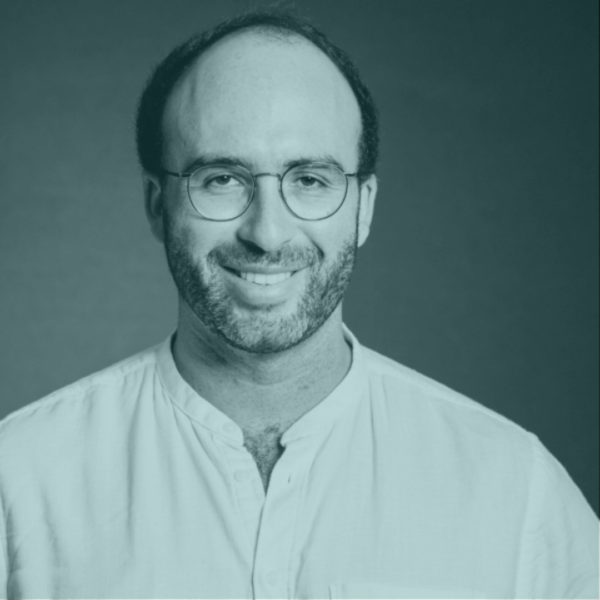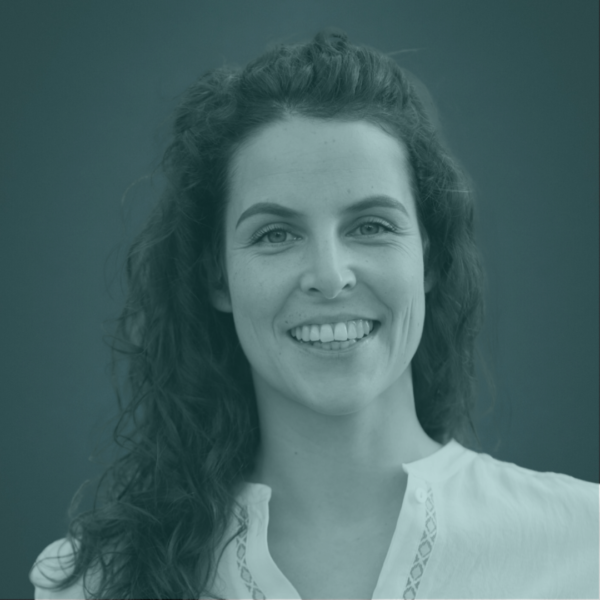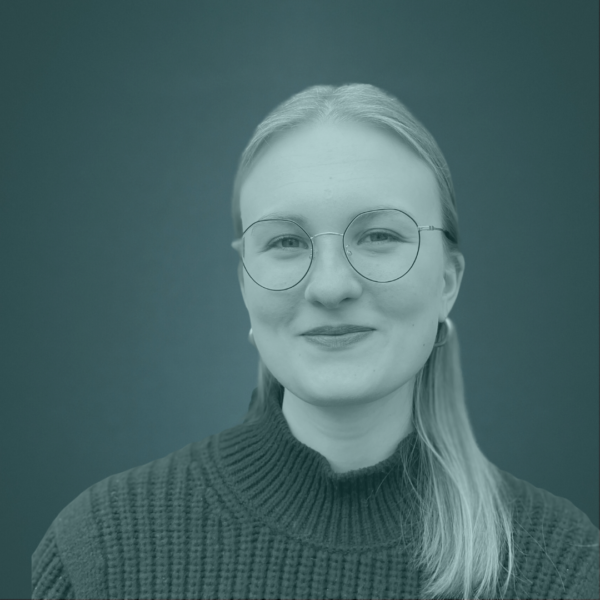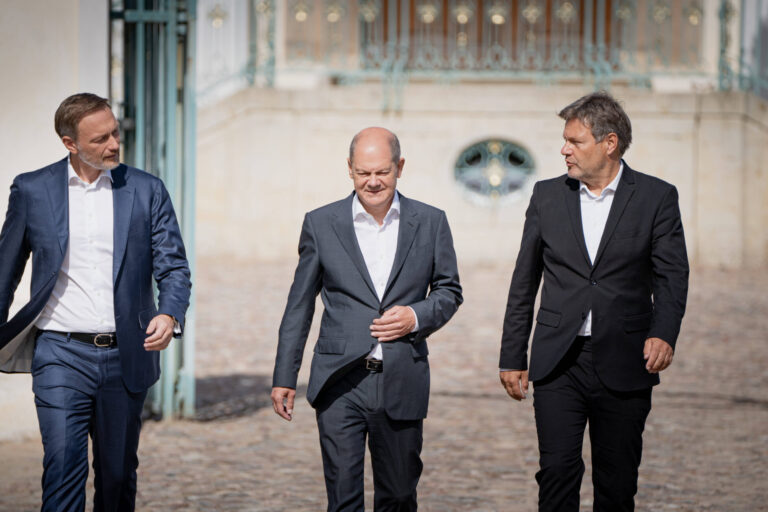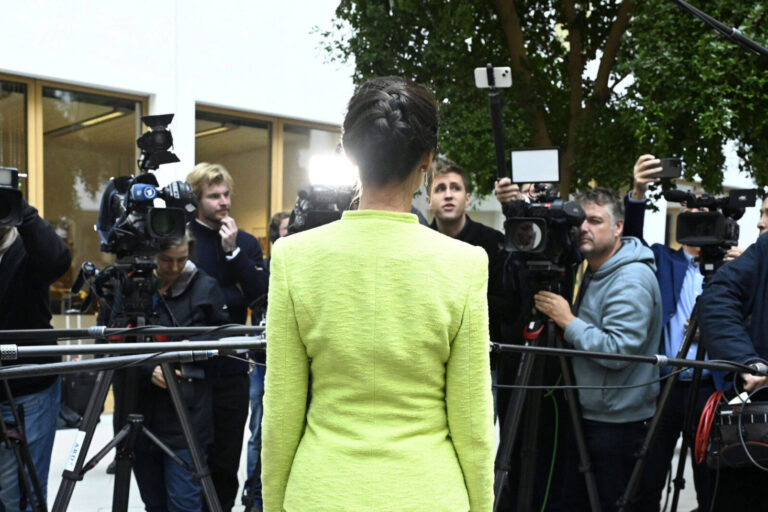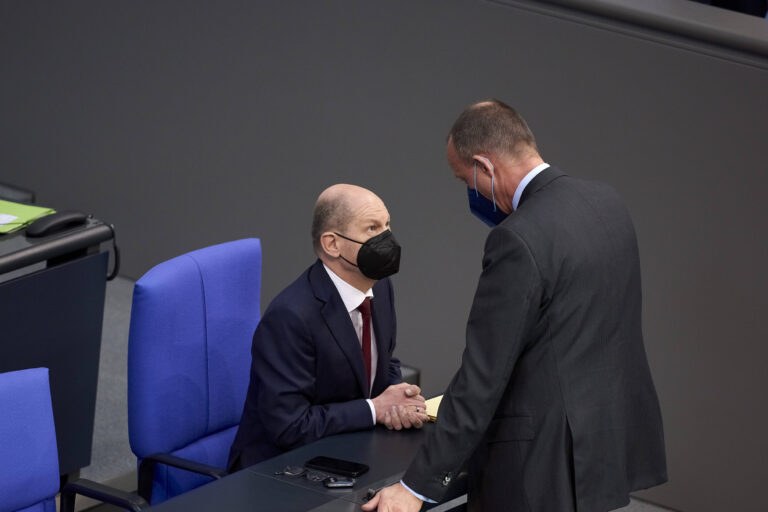A capital shaped by competing visions, an east German city in the midst of a comeback, and a sprawling post-industrial metropolis tackling 21st-century transformations head-on: The first of two delegation trips brought our New Urban Progress fellows to Berlin, Leipzig, and the Ruhr Valley – urban spaces in Germany that are defining the future of the city.
Meeting for the first time, our fellows from the United States and Germany visited urban leaders who are making cities more innovative, democratic and sustainable. After a ten month digital work phase, the main goal of the delegation trip was to engage with best practices of urban progress and transatlantic cooperation in Germany.
From staff at the United States Embassy in Berlin, to Fridays for Future organizers, to the Mayors of Leipzig and Wuppertal as well as the Berlin State Secretary for Housing, the New Urban Progress fellows will be able to apply a wide range of approaches and lessons-learned to their project work. Below, see how our trip as a whole was a transatlantic exchange on the future of cities by exploring the places we visited on a map, checking-out our day-to-day itinerary, reading the trip journals, and watching short videos from our adventures.
Want to learn more and read the results? Sign up for our newsletter here.
Our Trip: A Week in Germany
Friday, October 15 – Democratizing the City
At the beginning of the delegation trip, the New Urban Progress fellows attended Innocracy 2021, a conference on democratic innovation.
New Urban Progress at Innocracy 2021: Democratizing the City
Cities are dynamic networks brimming with social, economic and political life. Yet, how inclusive and reflective are these spaces of everyday people’s interests and needs? During the Innocracy 2021 conference, New Urban Progress fellows Victoria Boeck, Julian St Patrick Clayton, and Richard Lawrence Jr. gave lightning talks on democratizing the city. The discussion was moderated by Diego Rivas, Project Manager at Das Progressive Zentrum.
Sunday, October 17 – Visions
After a free day of exploring Berlin on Saturday, the fellows toured places that were once future visions of Berlin.
Contrasting visions of Hansaviertel and Karl-Marx-Allee
When Berlin was divided between East and West, the cold war competition also shaped urban planning. Hansaviertel is a neighborhood where the West’s ideas about modernity were put into practice, with residential buildings from many of the most cutting-edge post-war architects such as Le Corbusier, Oscar Niemeyer, Alvar Aalto or Walter Gropius. The Karl-Marx-Allee in the East presents a starkly contrasting vision: A grand boulevard lined with so-called “Arbeiterpaläste” (worker’s palaces), it was built as a show of strength towards the West. While visiting these unrealized visions, the fellows discussed why visions for a city are necessary, but also how visions can become a reality.
Current visions of the city: Innovation, Housing and Activism, Green Citizen Initiatives and Local Politics
To discuss Berlin’s current visions and how they are being implemented, the fellows focused on how actors in Berlin are making the city more innovative and more green.
- Innovation: Meeting with Adriana Groh of Sovereign Tech Fund and the New Institute, we discussed how cities can support innovation sustainably and the role of open source software in urban environments.
- Local Politics and a Green Community: We also met district councilwoman in Friedrichshain-Kreuzberg Julie Richier. A member of the Green Party (Bündnis 90/Die Grünen) and previously policy advisor on climate and international issues to the Berlin Senate, on a walking tour of the neighborhood, Julie talked about current initiatives on how the district is trying to make housing more affordable and the community as a whole more sustainable.
Living the Transatlantic Relationship
At the core of New Urban Progress is strengthening the relationship between the United States and Germany. Our delegation met with other leading transatlantic actors to informally discuss the future of transatlantic relations and what role urban spaces could play in improving transatlantic ties. With representatives from the Atlantic Brücke, German Federal Foreign Office, US Embassy and more, an impactful exchange took place. Elisabeth Niejahr gave a keynote speech on the role of local democracies in the transatlantic partnership complemented by a second keynote by Olaf Boehnke on building alliances of liberal democracies.
Monday, October 18 – Contested Spaces
On Monday, the fellows went to two contested and unique spaces in Berlin: the former Tempelhof airport and Kottbusser Tor.
The former Tempelhof airport
A vast expanse in the middle of the city: The former Tempelhof airport field is a unique public space made possible by the closing of the inner-city airport in 2008. Especially in the summer, the 355-hectare-park is brimming with activity. Built by the Nazis, the location of the Berlin Airlift and now a public park – this space has experienced drastically different purposes. After walking across the public park, we toured the former airport building, learning about its past as well as its current and future visions.
North of the former airport turned park, the fellows visited the floating university. Stylized as the “Floating University”, this is no ordinary university, but an experimental place for learning, art, and neighborhood activism. It uses the rainwater collection basin of the former Tempelhof airport for numerous projects ranging from an “urban practice-in-residence” programme to a Kids Uni.
CityLAB
CityLAB brings together government, civil society, academia and start-ups to support digital innovations and to improve public services. The lab puts a special focus on civic participation, innovative administration, open data, and sustainability. It is developing a smart city strategy for Berlin. Examples for how the CityLAB employs digital tools to improve civic participation include the digital platform “Gieß den Kiez” (water the neighborhood), where citizens have coordinated supplying public green spaces more than 7000 hectoliters of water in 2021. CityLAB is a project by the Technologiestiftung Berlin. New Urban Progress fellow Victoria Boeck works as Research Associate for open data at the lab.
Kottbusser Tor
Kottbusser Tor is an iconic place around the subway station of the same name in the Kreuzberg district of Berlin. It is home to social housing and, historically, a large Turkish immigrant community.
New Urban Progress fellows toured the neighborhood with Wenke Christoph, Berlin’s State Secretary Urban Development and Housing. Also on the tour was an organizer from Kotti Coop, a non-profit group that works on improving civic participation in planning processes. On the tour, our fellows were able to learn about current housing policies in Berlin and what multiple actors are doing to make housing more affordable and accessible.
Drinks with local journalists and tech innovators
At the end of the day, New Urban Progress fellows had the opportunity for an informal exchange with journalists from Der Tagesspiegel. Two journalists who focus each on one of Berlin’s districts for Tagesspiegel Leute, a set of weekly newsletters for each of Berlin’s twelve districts, led the discussion. Afterwards, the fellows talked to tech and innovation leaders living in Berlin.
Tuesday, October 19 – Transatlantic Dialogue
On Tuesday, the New Urban Progress fellows travelled from Berlin to Leipzig. In both cities, they talked to actors deeply involved in the transatlantic partnership, including climate activists and having dinner with Leipzig’s Deputy Mayor.
US Embassy
Situated right beside the Brandenburg Gate, the US embassy in Berlin is representative of the crucial role transatlantic relations have played in modern German history. The fellows met with a Political Advisor, the Technology and Science Advisor, and Economic Counselor to discuss new approaches to transatlanticism for today and the future.
Senate Chancellery for International Affairs
The Berlin Senate Chancellery for International Affairs manages the city government’s 17 city partnerships and membership in numerous city networks. The fellows met with Thomas Honeck and Evelyn Baldenhofer. Thomas Honeck is an urban researcher, human geographer and media scientist. At the Chancellery, he is in charge of international network policies. Evelyn Baldenhofer is commissioner for Berlin’s transatlantic relations and coordinates Berlin’s city partnerships.
Meeting Fridays For Future activists
Before setting out to Leipzig, the New Urban Progress fellows met two young activists, Carla Reemtsma and Nick Heubeck from Fridays For Future. Berlin is a major hub for the youth climate movement: More than 100,000 people participated in protests on 24 September 2021 in Berlin, demanding bold climate policies ahead of the German election. In their exchange with New Urban Progress, the activists explained their grassroots approach to organizing locally, nationally, and transnationally.
A reception at DAIS
The German-American Institute Saxony (Deutsch-Amerikanisches Institut Sachsen, DAIS) in Leipzig is strengthening the transatlantic partnership by bringing actors far away from the capital into the conversation. At the institute, the fellows discussed with DAIS representatives the role that cities and regions can play in improving ties between the two countries.
Dinner with Leipzig Deputy Mayor Ulrich Hörning
Before being elected Deputy Mayor of Leipzig in November 2015, Ulrich Hörning worked at the World Bank and in Germany’s Federal Ministry of Finance. The main topics on his agenda are Leizig’s future urban development and digitalization. Over dinner, he discussed with the fellows how to involve all of society in long-term city planning, such as the Leipzig 2030 development plan.
Wednesday, October 20 – Development from the Top and from Below
On Wednesday, the fellows explored city development from three angles: long-term city planning, entrepreneurship, and civic activism.
Leipzig 2030
Leipzig has grown rapidly. At the Leipzig City Hall, the New Urban Progress fellows received a presentation from urban planners about Leipzig 2030 and how the city is working on making their comeback more permanent while raising the international profile of the city. The fellows also met with the Mayor of Leipzig Burkhard Jung.
SpinLab
SpinLab is a start-up accelerator based in Leipzig. Working with numerous partners, among them Dell Technologies and the Red Cross, SpinLab offers free support for young entrepreneurs to put their ideas into practice. A special focus lies in e-health, energy and smart city innovation. At SpinLab, the fellows were introduced to some of the start-ups that the start-up accelerator has helped grow.
Unteilbar
Unteilbar (indivisible) is a civil society organization that has initiated large protests focused on anti-racism and social, gender, and climate justice. The first #unteilbar protest in Berlin attracted more than 240,000 people. Talking to the New Urban Progress fellows, the Unteilbar organizers explained how they unite actors from across civil society against the far right and for migration to keep communities open and welcoming to people from all backgrounds.
Cycling through Leipzig’s West
The New Urban Progress fellows explored Leipzig’s western neighborhood Plagwitz by bike! Biking through Leipzig, we were able to put streets and buildings to all of the plans and policies that we heard about. Plagwitz is an area of the city that has made a surprising comeback, thanks to both far-sighted city planning and contributions from an active civil society.
Thursday, October 21 – Structural Change
On a stormy Thursday, the fellows took a train from Leipzig to the Ruhr Valley and began exploring the vast metropolitan area with two tours through Essen.
Structural Change in Essen
The Ruhr Valley used to be Germany’s strongest industrial region. The city of Essen was one major urban center in the sprawling metropolitan area that encompassed some of Europe’s largest coal mines and steel mills. For several decades, the region has been deeply shaped by structural change as old jobs have moved away. During a tour of the city, the New Urban Progress fellows gained an understanding how the urban landscape of Essen has been shaped by the global processes underlying the structural changes.
Folkwang Museum
Today, the Ruhr region has become internationally acclaimed for its arts and culture scene, but art has a long tradition in the area: Founded in 1902, Museum Folkwang is a leading museum of modern art. Our fellows had the opportunity to visit the museum’s exhibitions at the newly built museum site, which was constructed for the RUHR.2010 project when Essen was European Capital of Culture.
Friday, October 22 – Ecological Transformations
On Friday, the fellows saw how a region struggling through a difficult economic transition can still successfully tackle the climate crisis.
Wuppertal Institute
The Wuppertal Institute for Climate, Environment, and Energy is a research institute and think tank focusing on climate and sustainability issues. Located in the city of Wuppertal, its research areas span the energy transition, sustainable consumption and mobility. The New Urban Progress fellows learned how the Institute advises cities on how to manage the ecological transformation.
Lunch with Wuppertal Mayor Uwe Schneidewind
Uwe Schneidewind was director of the Wuppertal Institute for ten years before he was elected the city’s Lord Mayor in November 2020. A member of the Green Party (Bündnis 90/Die Grünen), he is considered one of Germany’s foremost economists and a preeminent expert in sustainability research. Over lunch, he discussed with the New Urban Progress fellows the role of different actors in implementing change in an urban environment.
Walking through “Klimaquartier Arrenberg”
Arrenberg is a neighborhood in Wuppertal with a dedicated community, organized in the non-profit “Aufbruch am Arrenberg”. Aufbruch can be translated either as “new start” or “departure” and signifies the neighborhood’s commitment to proactively manage change, oriented at the United Nations sustainable development goals. A major initiative is designating the neighborhood as a “Klimaquartier” (climate quarters), aiming to make living in Arrenberg climate-neutral by 2030. The New Urban Progress fellows toured the neighborhood to see such projects in practice.
Discovering an Industrial Park in Duisburg
The coal and steel industry was not only the major source for the Ruhr Valley’s economic power. It was also the first trade to be liberalized in Western Europe in the Coal and Steel Community, an early building block of European integration that would eventually develop into the European Union. Duisburg, a city in the western part of the metropolitan region, soon realized that even after they closed, the industrial sites were still vital to the region’s culture. The Industrial Park in Duisburg (Landschaftspark Duisburg-Nord) is a public park that was designed for the International Architecture Exhibition Emscher Park in 1989. Today, it is often ranked as one of the best urban green spaces, precisely because it preserves and integrates many of the old industrial sites as monuments to the city’s industrial legacy. The New Urban Progress fellows experienced the park at night, when the decommissioned industrial buildings are lit in spectacular colors.
Saturday, October 23 – Monuments of the Past, for the Future
Before saying goodbye, the fellows visited the Zeche Zollverein, an internationally acclaimed coal mine-turned-monument and cultural site.
Zeche Zollverein
The Zeche Zollverein is a former coal mine that was closed in 1986. In 2001, it was designated a UNESCO World Heritage Site. It is one of the Ruhr Valley’s best known industrial monuments and hosts many cultural institutions, including the Ruhrmuseum and the Folkwang University of the Arts. Zeche Zollverein’s green spaces also have exceptional biodiversity. During their final day of the delegation trip, the New Urban Progress fellows toured the site and visited an exhibition focused on the life and economic contributions of the Turkish diaspora in Germany.
Trip Journals
Sunday, October 17, Berlin: Two Visions. Similar Challenges
Monday, October 18, Berlin: Transformations and the City of the Future
Tuesday, October 19, Berlin & Leipzig: Transatlantic Conversations
Wednesday, October 20, Leipzig: “ The future of cities. Not for granted.“
Friday, October 22, Ruhr Valley: Industrial Legacy and Climate Transformation
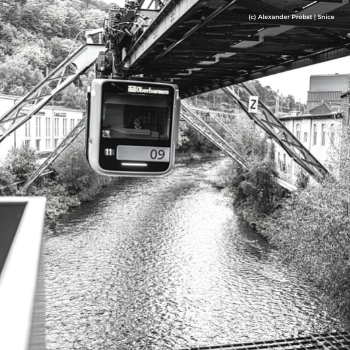
This was one side of the Atlantic – next year, we will see the other: In 2022, New Urban Progress will embark on a delegation trip through three US cities that are grappling with the urban challenges of today and tomorrow: Chicago, IL, Austin, TX, and Denver, CO. Until then, our fellows will continue meeting in digital working groups. Stay tuned for more!
New Urban Progress is the joint metro initiative of Das Progressive Zentrum, the Alfred Herrhausen Gesellschaft and the Progressive Policy Institute. The project is supported by the Transatlantic Program of the Federal Republic of Germany and funded by the European Recovery Program (ERP) of the Federal Ministry of Economics and Energy (BMWi).

